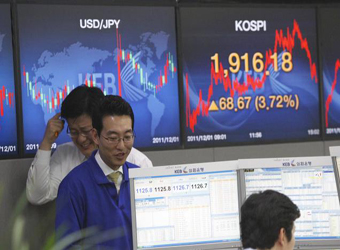Stock markets in Japan and Australia closed slightly higher Monday, with several major exchanges closed for a Labor Day public holiday.
Australia’s ASX 200 closed up 32.33 points, or 0.55 percent, at 5,956.40, with most sectors finishing higher. The energy and materials sectors closed down 0.13 percent and 0.05 percent respectively.
Oil plays struggled for gains and finished mostly lower. Oil Search shares closed down 0.55 percent, Santos was down 0.86 percent, Woodside Petroleum bucked the downward trend to close fractionally higher by 0.16 percent. Beach Energy fell 1.36 percent and Origin Energy was down 0.14 percent.
In Japan, the Nikkei 225 gained 113.78 points, or 0.59 percent, to 19,310.52, with energy names also struggling — shares of Inpex fell 0.8 percent and Japan Petroleum was down 1.44 percent.
U.S. oil prices was down 0.14 percent at $49.26 a barrel at 2:05 p.m. HK/SIN on Monday.
The week sets up for several key events, including central bank decisions in Australia and the United States, a second round of presidential election in France and corporate earnings.
“We have the Fed funds futures pricing at 64 percent chance of a June hike (from the Federal Reserve), but the pricing mechanism could also easily change given we have pretty much every key piece of U.S. economic data being released,” said Chris Weston, chief market strategist at spreadbettor IG, in a note.
In the currency market, the dollar index, which measures the greenback against a basket of currencies, traded at 99.17 at 2:06 p.m. HK/SIN, after climbing from an earlier low of 98.95.
Among other currency majors, the yen traded at 111.69 to the dollar, weakening from levels below 111.3 reached last week. This gave major exporters a small boost, with Toyota shares up 0.12 percent, Nissan up 0.57 percent, Honda up 0.4 percent and Sony gaining 3.03 percent.
Meanwhile, the Australian dollar fetched $0.7485, down from levels above $0.7500 early in the previous week, while the euro traded at $1.0888.
“Commodity currencies are coming off a terrible week and there are signs things could get even uglier in the near term,” said Stephen Innes, a senior trader at OANDA, in a note. He added that he expected the Reserve Bank of Australia (RBA) to hold interest rates and “likely express little stomach for raising interest rates anytime soon, as inflation concerns disappoint.”
“If anything, the RBA may sound more dovish than the current market lean, which will pressure the Aussie dollar further,” said Innes.
Source: CNBC
